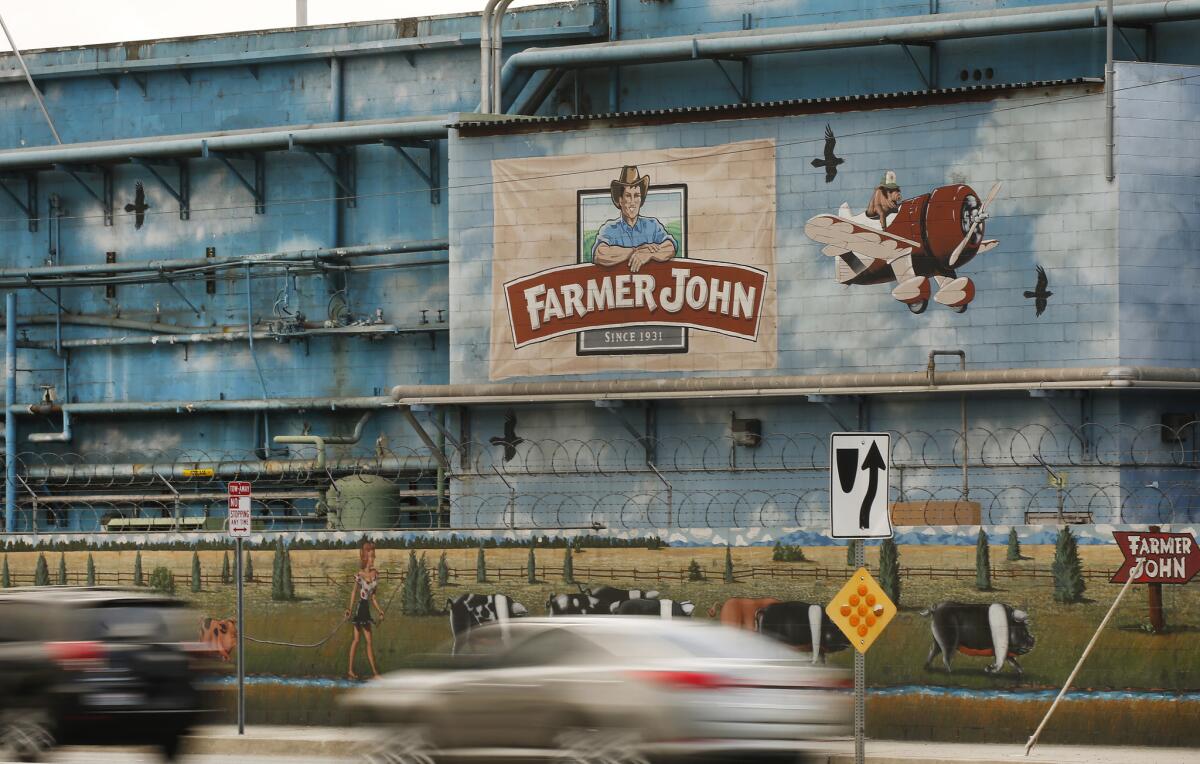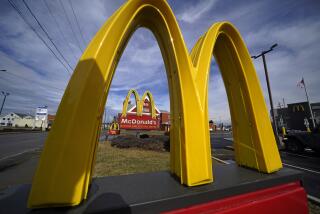Coronavirus outbreaks hits Farmer John, 8 other plants in Vernon

- Share via
Outbreaks of COVID-19 have struck nine industrial facilities in Vernon, including five meatpacking plants, Los Angeles County health officials said Sunday.
The largest outbreak occurred at the Smithfield Foods-owned Farmer John plant — producer of the beloved Dodger Dog — where 153 of 1,837 employees tested positive for COVID-19 between March and May, the Department of Public Health said.
The other eight facilities with outbreaks are CLW Foods (meat), Vie De France Yamazaki (baked goods), California Farms Meat (meat), Takaokaya USA (green tea), F. Gavina & Sons (coffee), Golden West Trading (meat), Overhill Farms (frozen food), and Rose & Shore (deli meat and prepared foods).
Between five and 24 employees at each of the facilities tested positive, county data show, although it wasn’t clear when those numbers were last updated. By the county’s standards, an outbreak has occurred when five or more workers have contracted the novel coronavirus.
Though Vernon has just a few dozen residents and is almost exclusively industrial, workers who have contracted the virus in the city just south of Los Angeles could spread it in their own communities, the county warned. On Sunday, health officials reported 940 new cases of the novel coronavirus and 14 related deaths countywide.
“We are closely monitoring outbreaks within facilities in the city of Vernon, as many of the employees reside in adjacent southeast Los Angeles communities,” said Barbara Ferrer, the county health director.
Freddie Agyin, Vernon’s director of health and environmental control, said the city is working with L.A. County to make sure that employees who have tested positive — as well as others with whom they’ve come into contact while at work — are quarantined for 14 days.
“It’s been very concerning to see these numbers come in,” said Agyin of the outbreaks. “If everyone isn’t following the guidelines that have been given by the [Centers for Disease Control and Prevention], it makes everybody’s work a lot more difficult.”
In a statement, Smithfield Foods said its workers are “crucial to our nation’s response to COVID-19.”
“We thank them for keeping food on America’s tables and have implemented aggressive measures to protect their health and safety during this pandemic,” the statement said.
Smithfield said those measures include a series of strict guidelines and protocols that follow or exceed guidance issued by the CDC and the Occupational Safety and Health Administration.
The company said it has boosted its supply of masks and face shields, installed Plexiglas barriers on the production floor and in break areas and implemented mass temperature scanning systems to screen workers.
Employees are offered free testing for the novel coronavirus and paid quarantine time, and are told not to report to work if they are sick, Smithfield said. The company has also relaxed its attendance policies, eliminated co-pays for coronavirus-related treatment and extended a paid leave benefit to employees deemed medically at-risk.
Of the 153 Farmer John employees who tested positive, 41 have returned to work, according to L.A. County health officials.
“During this pandemic, our entire industry is faced with an impossible choice: continue to operate to sustain our nation’s food supply or shutter in an attempt to entirely insulate our employees from risk,” the company said in a statement issued in early May. “It’s an awful choice; it’s not one we wish on anyone. It is impossible to keep protein on tables across America if our nation’s meat plants are not running.”
The outbreak at Smithfield’s Vernon plant is the largest listed by the county’s Public Health Department in a nonresidential setting.
COVID-19 outbreaks have plagued beef, pork and poultry processing plants nationwide since March. More than 10,000 cases have been linked to U.S. meatpacking plants, and at least three dozen workers are known to have died as of early May, according to an analysis by the nonprofit news organization ProPublica.
Many of those workers are members of vulnerable refugee and immigrants communities. Given the nature of the work — with hundreds of employees standing shoulder-to-shoulder for hours each day, sorting, cutting and packaging the meat that feeds Americans — such plants have become virus hot spots.
In the agricultural powerhouses of Iowa and South Dakota, close to one-fifth of the workforce in the states’ largest slaughterhouses had fallen ill, according to a CDC report released earlier this month.
In California, at least 138 employees at Central Valley Meat Co. in Hanford tested positive for the virus. That company employs about 900 workers at its two plants; the other is in Vernon.
Los Angeles Times staff writer Jaclyn Cosgrove contributed to this report.
More to Read
Sign up for Essential California
The most important California stories and recommendations in your inbox every morning.
You may occasionally receive promotional content from the Los Angeles Times.











